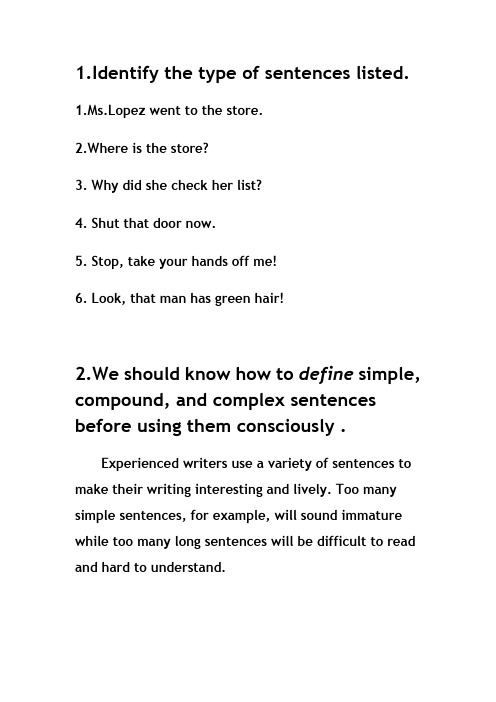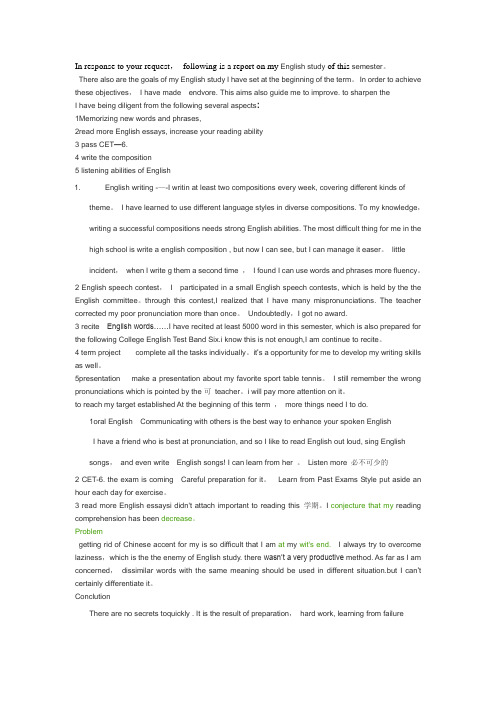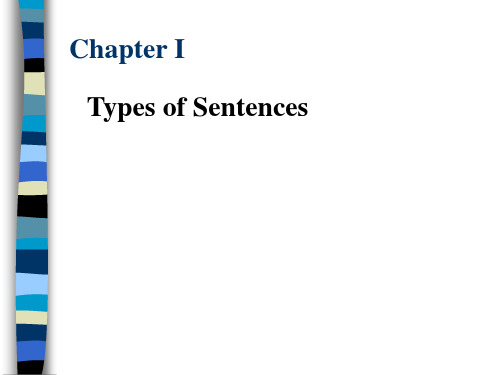Different kinds of sentences英语写作
- 格式:pptx
- 大小:126.00 KB
- 文档页数:1

1.Identify the type of sentences listed.1.Ms.Lopez went to the store.2.Where is the store?3. Why did she check her list?4. Shut that door now.5. Stop, take your hands off me!6. Look, that man has green hair!2.We should know how to define simple, compound, and complex sentences before using them consciously .Experienced writers use a variety of sentences to make their writing interesting and lively. Too many simple sentences, for example, will sound immature while too many long sentences will be difficult to read and hard to understand.SIMPLE SENTENCEA simple sentence, also called an independent clause, contains a subject and a verb, and it expresses a complete thought. In the following simple sentences, subjects are in yellow, and verbs are in green.The three examples above are all simple sentences. Note that sentence B contains a compound subject, and sentence C contains a compound verb. Simple sentences, therefore, contain a subject and verb and express a complete thought, but they can also contain a compound subjects or verbs.COMPOUND SENTENCEA compound sentence contains two independent clauses joined by a coordinator. The coordinators are as follows: for, and, nor, but, or, yet, so. (Helpful hint: The first letter of each of the coordinators spells FANBOYS.) Except for very short sentences, coordinators are always preceded by a comma. In the following compound sentences, subjects are in yellow, verbs are in green, and the coordinators and the commas that precede them are in red.A. I tried to speak Spanish, and my friendtried to speak English.B. Alejandro played football, so Mariawent shopping.C. Alejandro played football, for Mariawent shopping.The above three sentences are compoundsentences. Each sentence contains two independent clauses, and they are joined by a coordinator with acomma preceding it. Note how the conscious use of coordinators can change the relationship between the clauses. Sentences B and C, for example, are identical except for the coordinators. In sentence B, which action occurred first? Obviously, "Alejandro played football" first, and as a consequence, "Maria went shopping. In sentence C, "Maria went shopping" first. In sentence C, "Alejandro played football" because, possibly, he didn't have anything else to do, for or because "Maria went shopping." How can the use of other coordinators change the relationship between the two clauses? What implications would the use of "yet" or "but" have on the meaning of the sentence?COMPLEX SENTENCEA complex sentence has an independent clause joined by one or more dependent clauses. A complex sentence always has a subordinator such as because, since, after, although, or when or a relative pronoun such as that, who, or which. In the following complex sentences, subjects are in yellow, verbs are in green, and the subordinators and their commas (when required) are in red.A. When he handed in his homework, heforgot to give the teacher the last page.B. The teacher returned the homeworkafter she noticed the error.C. The students are studying because theyhave a test tomorrow.D. After they finished studying, Juan andMaria went to the movies.E. Juan and Maria went to the moviesafter they finished studying.When a complex sentence begins with a subordinator such as sentences A and D, a comma is required at the end of the dependent clause. When the independent clause begins the sentence with subordinators in the middle as in sentences B, C, and E, no comma is required. If a comma is placed before the subordinators in sentences B, C, and E, it is wrong.Note that sentences D and E are the same except sentence D begins with the dependent clause which is followed by a comma, and sentence E begins with theindependent clause which contains no comma. The comma after the dependent clause in sentence D is required, and experienced listeners of English will often hear a slight pause there. In sentence E, however, there will be no pause when the independent clause begins the sentence.COMPLEX SENTENCES / ADJECTIVE CLAUSES Finally, sentences containing adjective clauses (or dependent clauses) are also complex because they contain an independent clause and a dependent clause. The subjects, verbs, and subordinators are marked the same as in the previous sentences, and in these sentences, the independent clauses are also underlined.Adjective Clauses are studied in this site separately, but for now it is important to know that sentences containing adjective clauses are complex."sentence identification" quizzes1: Helen Keller was born in Tuscumbia, Alabama, in 1880 and died in 1968.SimpleCompoundComplex2: Until she was 19 months of age, her sight and hearing were normal.SimpleCompoundComplex3: At the age of 19 months, a severe illness left her deaf and blind.SimpleCompoundComplex4: When she was seven, she began her education in reading and writing with Anne Sullivan of the Perkins Institute for the Blind.SimpleCompoundComplex5: Through persistence and stubbornness, Anne breaks through Helen's walls of silence and darkness and teaches her to communicate.SimpleCompoundComplex6: Helen Keller learned to read by the Braille system, and she learned to write by using a specially constructed typewriter.SimpleCompoundComplex7: Later, she entered Radcliffe College and graduated with honors in 1904.SimpleCompoundComplex8: Helen Keller's story needed to be told, so in 1962, a beautiful movie was made about her life.SimpleCompoundComplex9: "If there were only joy in the world, we could never learn to be brave and patient." -- Helen KellerSimpleCompoundComplex10: "Life is either a daring adventure, or it is nothing." -- Helen KellerSimpleCompoundComplextextbook: p37 P38 exercise.3. Read textbook P 39-40.What are the effects of loose, periodic, and balanced sentences?textbook: p41 exercise.4.Short sentences & Long sentences Read 4 discourses in our textbook P 42-43.What are the effects of short sentences & long sentences?。

内容丰富化英语作文English: In order to enrich the content of our English writing, we can incorporate a variety of strategies. Firstly, we can enhance our vocabulary by regularly reading books, articles, and other written materials. This exposure to a wide range of words and phrases will help us express ourselves more fluently and precisely. Secondly, we can diversify our sentence structures by studying different types of sentences such as simple, compound, complex, and compound-complex sentences. This will make our writing more engaging and dynamic. Additionally, we can improve the depth of our content by conducting thorough research on the topic we are writing about. Gathering relevant information and including supporting details will make our writing more informative and persuasive. Lastly, we can work on enhancing our writing style by experimenting with different tones, perspectives, and writing techniques. By constantly challenging ourselves to try new approaches, we can develop a more sophisticated and compelling writing style. Overall, by incorporating these strategies, we can significantly enrich the content of our English writing.中文翻译: 为了丰富我们的英语写作内容,我们可以采用多种策略。

中英文写作的区别英语作文It is important to understand the differences between writing in English and Chinese. Writing in English often prioritizes clarity and directness, while Chinese writing may lean more towards symbolism and indirect expression. In English, writers tend to use more explicit and straightforward language, while in Chinese, writers often incorporate traditional idioms and idiomatic expressions to convey deeper meanings.理解中英文写作的区别是很重要的。
英语写作往往更注重清晰和直接,而中文写作可能更倾向于象征性和间接的表达。
在英语中,写作者倾向于使用更明确和直接的语言,而在中文中,写作者通常会结合传统成语和习语来传达更深层的含义。
One major difference between English and Chinese writing is the use of characters. In Chinese, characters are logograms, which means that one character can represent a whole word or an idea. This allows for a more compact form of writing, as each character carries a significant amount of meaning. In contrast, English uses an alphabet system, which requires the combination of letters to form words andconvey meaning. This fundamental difference in writing systems directly affects the structure and expression of written language in both English and Chinese.中英文写作的一个主要区别在于使用字符的方式。

In response to your request,following is a report on my English study of this semester。
There also are the goals of my English study I have set at the beginning of the term。
In order to achieve these objectives,I have made endvore. This aims also guide me to improve. to sharpen theI have being diligent from the following several aspects:1Memorizing new words and phrases,2read more English essays, increase your reading ability3 pass CET—6.4 write the composition5 listening abilities of English1. English writing -—-I writin at least two compositions every week, covering different kinds oftheme。
I have learned to use different language styles in diverse compositions. To my knowledge,writing a successful compositions needs strong English abilities. The most difficult thing for me in the high school is write a english composition , but now I can see, but I can manage it easer。

不同专业的对话英文作文英文:As a student majoring in English, I often find myself having conversations with students from other majors. These conversations can be interesting, as we have different perspectives and knowledge in our respective fields. Here are some examples of conversations I have had with students from different majors:1. Conversation with a student majoring in Business:Me: Hi, what are you studying?Student: I'm majoring in Business.Me: That's interesting. What kind of courses do you take?Student: I take courses in accounting, finance,marketing, and management.Me: Wow, that sounds like a lot. Which one do you like the most?Student: I really enjoy marketing. It's fascinating to learn how to promote a product or service.中文:作为一名英语专业的学生,我经常与其他专业的学生交谈。
这些对话可以很有趣,因为我们在各自的领域有不同的观点和知识。
以下是我与其他专业的学生进行的一些对话的例子:1. 与一位学习商科的学生的对话:我,你好,你在学什么?学生,我主修商科。

英语写译(1-词、句子)英语写译(1)(格式,词和句子)经济管理学院经济系A good manuscript form---- writing the title, leaving margins,indenting, capitalizing and dividing words.1. How to write a title (标题)?1) Write the title in the centre of the first line; if too long for one line, in the first and second lines. Second line is shorter.How a Knowledge of English has Helpedme in my Studies and Work2) Capitalize (大写) the first and last words except articles, coordinating conjunctions (and, or, but ,nor , for ),short propositions and to in infinitives.Titles:The People Without a CountryRules to Abide ByThe Myth of a “Negro Literature”3) No period(句号) is used at the end of a title. Question mark(问号), quotation marks (引号) are OK.2. Word Division (移行)The general principle is to divide a word according to its syllables. Pay attention to the following :1.One-syllable (单音节)words like through,march,brain andpushed cannot be divided.2.One letter of a word cannot be written at the end or at thebeginning of a line, even if that one letter makes up a syllable:a.lone, trick.y.3) Do not put a two –letter syllable at the beginning of a line: hat-ed, cab-in.4) Avoid separating proper names of people and places: Chi-na, Aus-ten.5)Divide hyphenated words only at the hyphen: father-in-law, empty-handed.6) Do not divide words in a way that may mislead the reader:pea-cock,re-ally.7) Do not divide the last word on a page. Write the whole word on the next page.8) Divide words with prefixes and suffixes and the base part of the word: re-state-ment, un-relent-ing.9) Divide two-syllable words with double consonants between the two consonants(辅音): strug-gle, shat-ter.Attention: Word division is difficult.What is diction?Do you know a diction-nary?Diction is the choice and use of words.1. Levels of words:formal, common, and colloquial1) formal words: learned words, literary words or big words –formal writing, scholarly or theoretical works.a. three or more than three syllablesb. Greek or Latin originc. seldom used in daily conversation(formal) interrogate epoch ascend(common) question age mount (colloquial) ask time rise2) Common words: commonly used words3) Colloquial words:a. short wordsb. Saxon originfor example: guts (courage), guy (man),hassle (bother)2. The meaning of wordsFor example:a.b. Small 和 little = 小small 做客观的描写,little可能表示喜欢的感情;They lived in a small town.I will never forget the little town where I spent my happy childhood.c. Modest 和 humble (谦逊)modest是好的品德;humble常表示过分的自卑。
不同差异英文作文英文:As a language learner, I have encountered many differences between English and Chinese. One of the most obvious differences is the word order. In English, the word order is subject-verb-object, while in Chinese, it is subject-object-verb. For example, in English, we say "I love you," but in Chinese, it is "我爱你" (wǒ ài nǐ), which directly translates to "I love you."Another difference is the use of articles. English has definite and indefinite articles (the, a/an), while Chinese does not have articles. This can be confusing for Chinese learners of English, as they may struggle with when to use "the" or "a/an."Additionally, Chinese has a tonal system, which means that the meaning of a word can change depending on the tone used. For example, the word "ma" in Chinese can mean"mother," "hemp," "horse," or "scold," depending on the tone used. This is not present in English, so it can be a challenge for Chinese learners to master the correct tones.Furthermore, the use of tenses is different in English and Chinese. English has a more complex system of tenses, including present, past, future, and perfect tenses, while Chinese has a simpler tense system. Chinese learners of English often struggle with using the correct tense in sentences.Finally, idioms and expressions are also different between the two languages. English has a wide range of idiomatic expressions that may not have direct translations in Chinese, and vice versa. For example, the English expression "raining cats and dogs" does not have a direct equivalent in Chinese.中文:作为一个语言学习者,我遇到了许多英语和中文之间的差异。
中考英语书面表达写作技巧单选题60题1. In our school life, we often ______ different kinds of activities to enrich our experience.A. take part inB. joinC. attendD. enter for答案:A。
解析:take part in表示参加活动并在活动中起积极作用,这里说参加各种活动来丰富经验,用take part in合适;join通常指加入某个组织、团体或人群,例如join the club加入俱乐部;attend 侧重于出席,比如attend the meeting出席会议;enter for表示报名参加竞赛等,这里不是竞赛语境,所以A正确。
2. Family is very important. We should ______ good care of our family members.A. makeB. takeC. getD. have答案:B。
解析:take care of是固定短语,表示照顾、照料,是正确用法;make不能和care of搭配;get care of这种用法错误;have care of用法也不正确,所以答案是B。
3. My hobby is reading. I like to ______ books in the library duringmy free time.A. borrowB. lendC. keepD. return答案:A。
解析:borrow表示借入,在图书馆借书是借入,所以用borrow;lend表示借出,方向与题意不符;keep表示保存、保留,不能表达借书这个动作;return表示归还,不符合在空闲时间去图书馆的动作情境,所以A正确。
4. When we talk about friendship in school, we should ______ each other.A. trustB. believeC. dependD. rely答案:A。
1.Translate the following sentences into English(1)我们从我方在荷兰代理人处得悉你们的地址,现特去函希望能与贵公司发展合作关系。
We have your name and address from our agent in the Holland, we are writing with a desire to establish business relations with you.(2)我们公司专营各种家用电器的进口业务。
We specialize in the importation of various kinds of household electrical appliances.(3)信内附有我公司最新的带插图商品目录。
如有兴趣,请即与我公司联系。
We enclose a copy of the latest illustrated catalogue of our firm and we hope that you can contact us if any of the item interests you.(4)我们的开户银行是中国银行南京分行,该行可向贵公司提供我们公司的资信情况。
Our banker is Bank of China Nanjing Branch, which can provide you information about our character and finances.2.Translate the following letter into English先生们:我们从网上了解到贵公司与我公司业务项目相同,故致函贵方希望建立贸易关系。
我公司进军电器行业多年,现在是南京电器业界的最大进口商之一。
关于我公司的资信状况,贵公司可向中国银行南京分行咨询。
目前,我们对贵公司的无绳电话感兴趣,盼望尽快收到回函。